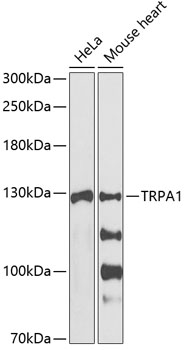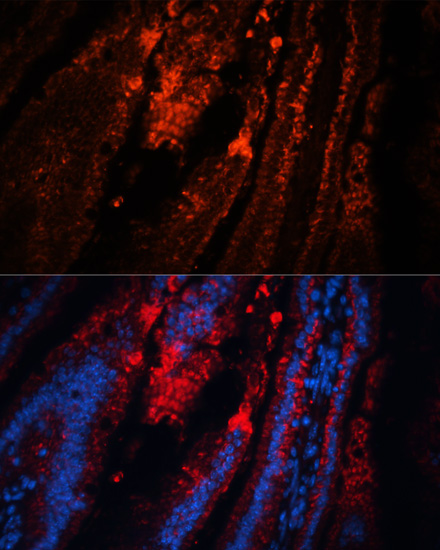-
Product Name
TRPA1 Polyclonal Antibody
- Documents
-
Description
Polyclonal antibody to TRPA1
-
Tested applications
WB, IF
-
Species reactivity
Human, Mouse, Rat
-
Alternative names
TRPA1 antibody; ANKTM1 antibody; FEPS antibody; transient receptor potential cation channel subfamily A member 1 antibody
-
Isotype
Rabbit IgG
-
Preparation
Antigen: A synthetic peptide corresponding to a sequence within amino acids 850-950 of human TRPA1 (NP_015628.2).
-
Clonality
Polyclonal
-
Formulation
PBS with 0.02% sodium azide, 50% glycerol, pH7.3.
-
Storage instructions
Store at -20℃. Avoid freeze / thaw cycles.
-
Applications
WB 1:500 - 1:2000
IF 1:50 - 1:200 -
Validations

Western blot - TRPA1 Polyclonal Antibody
Western blot analysis of extracts of various cell lines, using TRPA1 antibody at 1:1000 dilution.Secondary antibody: HRP Goat Anti-Rabbit IgG (H+L) at 1:10000 dilution.Lysates/proteins: 25ug per lane.Blocking buffer: 3% nonfat dry milk in TBST.Detection: ECL Basic Kit .Exposure time: 90s.

Immunofluorescence - TRPA1 Polyclonal Antibody
Immunofluorescence analysis of mouse intestine using TRPA1 antibody at dilution of 1:100. Blue: DAPI for nuclear staining.
-
Background
Receptor-activated non-selective cation channel involved in detection of pain and possibly also in cold perception and inner ear function. Has a central role in the pain response to endogenous inflammatory mediators and to a diverse array of volatile irritants, such as mustard oil, cinnamaldehyde, garlic and acrolein, an irritant from tears gas and vehicule exhaust fumes. Is also activated by menthol (in vitro). Acts also as a ionotropic cannabinoid receptor by being activated by delta(9)-tetrahydrocannabinol (THC), the psychoactive component of marijuana. May be a component for the mechanosensitive transduction channel of hair cells in inner ear, thereby participating in the perception of sounds. Probably operated by a phosphatidylinositol second messenger system (By similarity).
Related Products / Services
Please note: All products are "FOR RESEARCH USE ONLY AND ARE NOT INTENDED FOR DIAGNOSTIC OR THERAPEUTIC USE"
